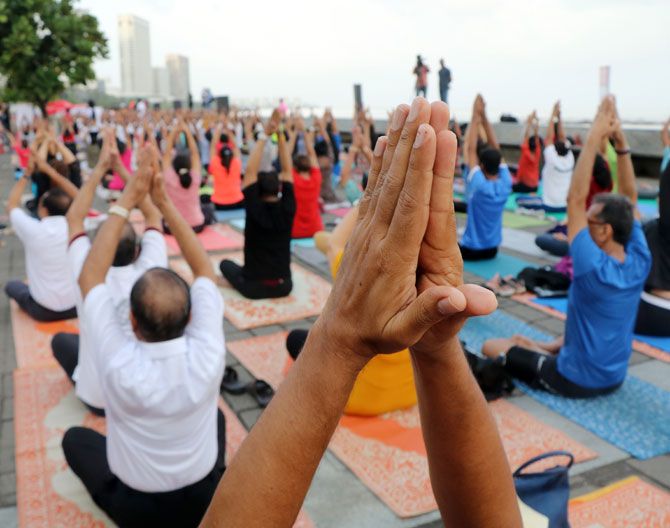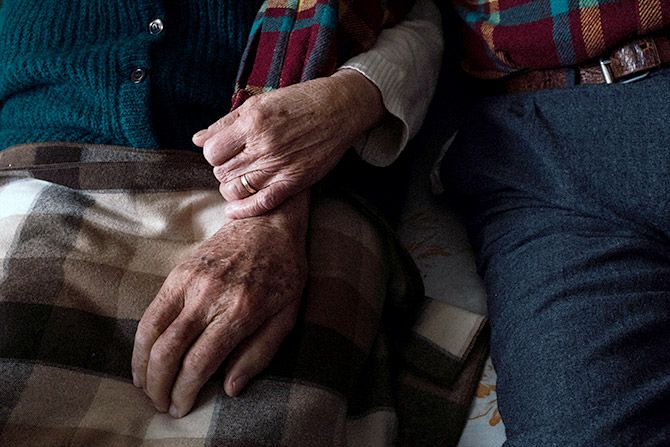'Since most of us are going through a difficult time during the pandemic, the foremost step to take care of our relationships is to practice understanding and compassion.'

Photograph: The Late Danish Siddiqui/Reuters
The pandemic has affected marriages in several ways.
While it may have brought some partners closer to each other given the increased time spent together, there are others who have drifted apart.
Luke Coutinho, co-founder at RESET, a holistic wellness centre located in Mumbai and Bengaluru, feels it is the lack of distractions and coping mechanisms that are to be blamed.
Routines that people enjoyed earlier like stepping out for work, meeting family and friends, as well as socialising, helped mask problems existing in several relationships.
The lockdowns only made those issues resurface and show their ugly side.
"A lot of us had access to distractions pre-pandemic," he says.
"So, even if someone wasn't happy in a particular relationship, there were coping mechanisms to handle the situation, like socialising, going out, etc.
"But with the forced lockdown most of us were tested on tolerance, acceptance, letting go, forgiveness -- which are some of the critical pillars of a healthy and meaningful relationship."
The pandemic has also made elders feel scared and vulnerable. The lack of routine has ended up making them feel unsettled.
"As human beings, we are hardwired to follow a routine and pattern.
"Not having a routine can leave us feeling directionless and without a clear intention," he reveals.
Luke offers advice on how people can take care of their relationships along with tips to help seniors tide through another lockdown in Part II of an interview to Anita Aikara/Rediff.com.
- PART 1: 'Youngsters are most affected'

Photograph: Hitesh Harisinghani/Rediff.com.
Does having a routine help in reducing anxiety?
Yes, it definitely does. When there is a routine, you have control over your day.
You are in a better position to handle what the day brings with it.
Your intentions are set and you know how much time, effort and energy you'd want to put into a particular thing.
As human beings, we are hardwired to follow a routine and pattern.
Having a routine also helps to schedule time for things that can nourish us emotionally, whether it is spending time with a loved one, engaging in a hobby, listening to music, doing yoga, etc.
Not having a routine can leave us feeling directionless and without a clear intention.
We can get thrown into different directions based on what life throws at us, and that can make one feel hopeless and anxious.

Illustration: Dominic Xavier/Rediff.com
How can one take care of their relationships during a pandemic?
The pandemic is responsible for an increase in friction among partners.
While in some cases relationships have become worse, for some, it has taken a turn and improved for the better.
There are partners who were initially separated, but have now reconciled during the pandemic.
On the other hand, there are partners who have separated or split due to various reasons that in a way resurfaced during the pandemic and lockdown.
A lot of us had access to distractions pre-pandemic, and so, even if someone wasn't happy in a particular relationship, there were coping mechanisms to handle the situation, like socialising, going out, etc.
But with the forced lockdown, most of us were tested on tolerance, acceptance, letting go, forgiveness -- which are some of the critical pillars of a healthy and meaningful relationship.
Since most of us are going through a difficult time during the pandemic, the foremost step to take care of our relationships is to practice understanding and compassion.
Such an attitude will help us respond to any situation, instead of reacting to it.
Do you think it is a good idea to limit one's intake of the news? Or should it be totally turned off? What about social media exposure?
Absolutely. While it is good to stay informed and updated, chasing news channels and media for every bit of update can only feed you with more fear, anger, insecurity, confusion and anxiety.
So one must know how to strike the right balance between staying informed and staying glued to the news.
Also, know which source of information or news is authentic. There are very few verified sources that share authentic information.
Discourage any social media forwards or discussions about the pandemic.
Unsubscribe from news and newsletters that induce fears. It's a major root cause of stress.
While we may have social media channels and chatting groups to vent out and express our stress, please understand that most of them do not help in any constructive way.
Be mindful of the amount of time you spend on social media, as most companies and brands today thrive on inducing fear in people.
Fear is what makes us vulnerable and unfortunately there are several business models that are built on this fact.

Photograph: Marzio Torniolo/Reuters
What can the aged people do to stay healthy mentally?
A few things senior citizens or their family members can do to manage their mental health are:
- If there is a balcony or terrace, encourage them to soak some morning sunlight or have access to some form of nature (trees, lakes, garden).
- Get them engaged in senior citizen yoga. There are various genuine sources for that.
- Involve them in basic and non-strenuous activities like chopping and peeling vegetables (if they can).
- Make sure they have minimum exposure to news and social media, especially channels and social media forwards that spread fake and incorrect information.
- Encourage them to spend time with their grandchildren.
- Try to engage in positive and constructive conversations with them. Make sure you lend them an ear.
- Involve them into prayer, meditation and reading.
- Involve them in watching stand-up comedy, music and movies they like.
- Teach them breathing exercises that they can do while at home. This will help quell their anxiety, boost lung health, and the immune system, as it helps maintain a positive frame of mind.
- Make them go through old pictures and photographs. Talking about old memories is a powerful way to boost mental and emotional health.









